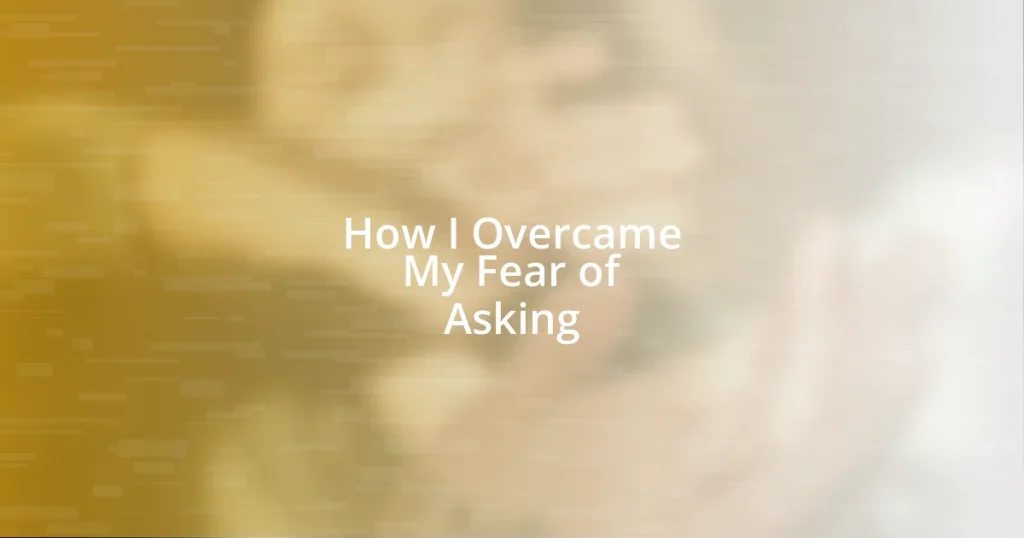Key takeaways:
- Reframing the fear of asking as an opportunity for connection can transform anxiety into confidence and open new doors.
- Identifying personal triggers and setting small, manageable goals helps in gradually overcoming the fear of asking.
- Seeking support from others and celebrating small victories are essential for building self-assurance and recognizing personal growth.
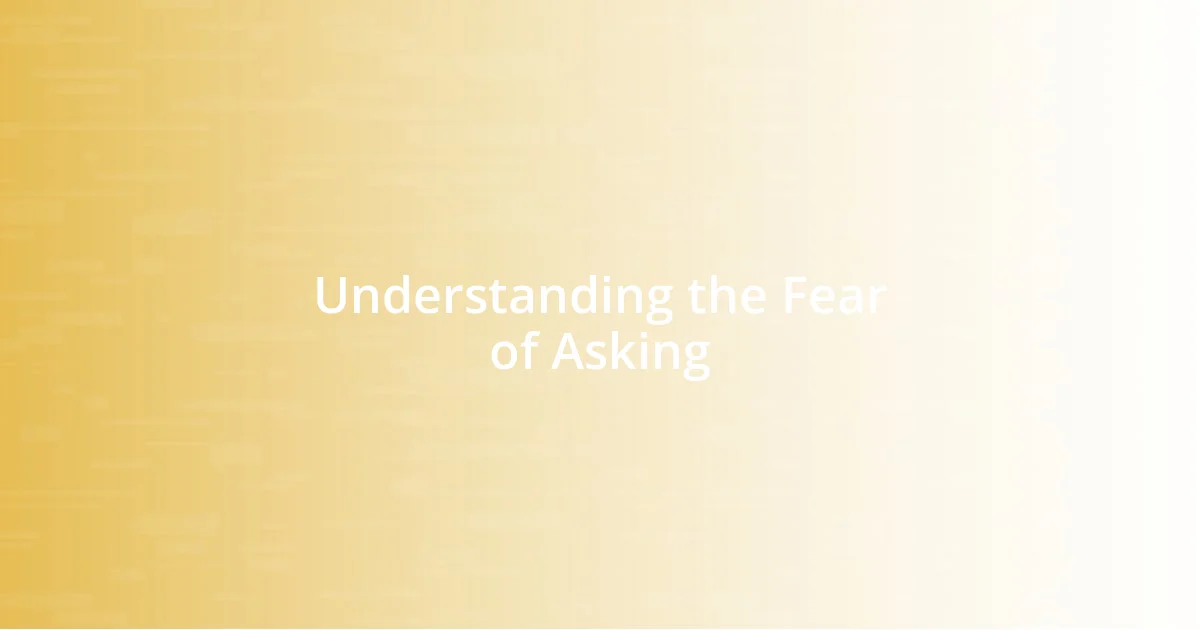
Understanding the Fear of Asking
I remember a particular moment vividly when I wanted to ask my boss for a small raise. My heart raced, and my palms felt clammy. I couldn’t shake the thought: “What if she says no?” This fear can be paralyzing, especially when all we want is a simple request.
There’s an interesting layer to the fear of asking. It often stems from a fear of rejection or judgment, shaped by past experiences. I’ve felt the sting of vulnerability in those moments when I hesitated because I feared how others might perceive me, wondering if I would be seen as needy or pushy instead of assertive.
What if we reframed the fear of asking in a more constructive way? Instead of viewing it as a threat, think of it as an opportunity to connect. Every time I finally mustered the courage to ask, I not only learned more about the other person’s perspective but also discovered a newfound confidence within myself. There’s power in asking; have you ever noticed how simply asking can open doors you didn’t even know existed?

Identifying Your Triggers
Identifying your triggers is crucial in overcoming the fear of asking. Reflecting on what specifically makes you anxious can reveal valuable insights. For me, it was situations where I felt unprepared or outnumbered. Those moments would send my mind racing, amplifying my fear of speaking up.
Here’s a few common triggers that I’ve recognized, and perhaps you can relate:
– High-Stakes Situations: Asking for a favor or a raise feels monumental.
– Judgment from Authority Figures: Those moments when a boss or mentor is present can heighten anxiety.
– Past Failures: Remembering unsuccessful attempts can replay in your mind, fueling fear.
– Unexpected Social Settings: Large groups or new environments can amplify insecurities.
– Internal Pressure: Setting high expectations for yourself can create a sense of defeat before you even begin.
Understanding these triggers not only helps you prepare but can also provide a sense of control, allowing you to confront your fears step by step.
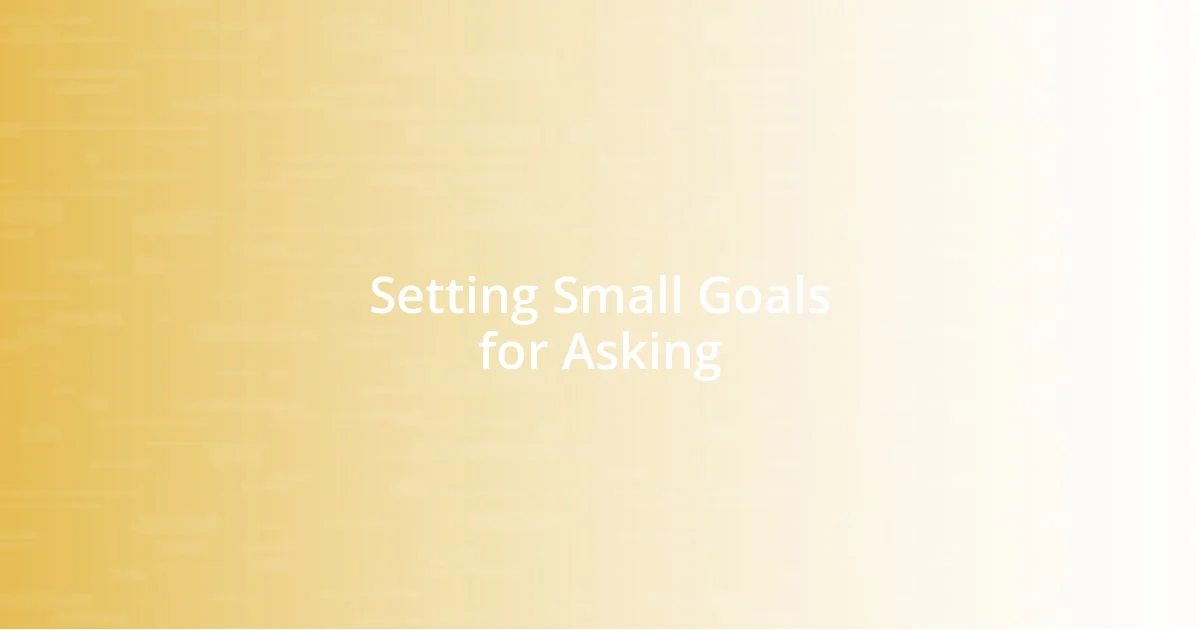
Setting Small Goals for Asking
Setting small goals for asking has been transformative in my journey. By breaking down my larger objectives into manageable steps, I learned to approach discussions with less anxiety. For example, I started with asking for small clarifications in meetings. Each time I spoke up, no matter how minor, I felt a surge of accomplishment that bolstered my confidence for the bigger asks that followed.
I still remember when I decided to set a goal of asking at least one question during each class or meeting. Initially, even that felt daunting, but I gradually realized that the stakes were lower than I imagined. Often, the questions I posed led to engaging discussions, transforming my fear into curiosity and connection. Setting these incremental goals taught me that each request didn’t have to be monumental; they could instead be small steps leading to greater self-assurance.
One tactic that worked wonders for me was pairing an asking goal with a positive affirmation. I would tell myself, “My questions are valid and deserve attention.” This mental shift allowed me to celebrate every small success, reinforcing the belief that asking is a worthy endeavor. Over time, those tiny victories accumulated into a significant transformation in how I viewed myself—going from a hesitant asker to someone who embraces opportunities to engage.
| Small Goals for Asking | Benefits |
|---|---|
| Ask for a favor from a friend | Builds insight into how asking can feel less daunting |
| Request feedback on a small project | Encourages constructive communication and minimizes anxiety around feedback |
| Inquire about a topic of interest during a casual conversation | Enhances engagement and normalizes asking |
| Express a simple preference (like a food choice) | Develops comfort in voicing needs |
| Ask a question in a low-pressure group setting | Reduces fear of rejection and fosters a sense of community |
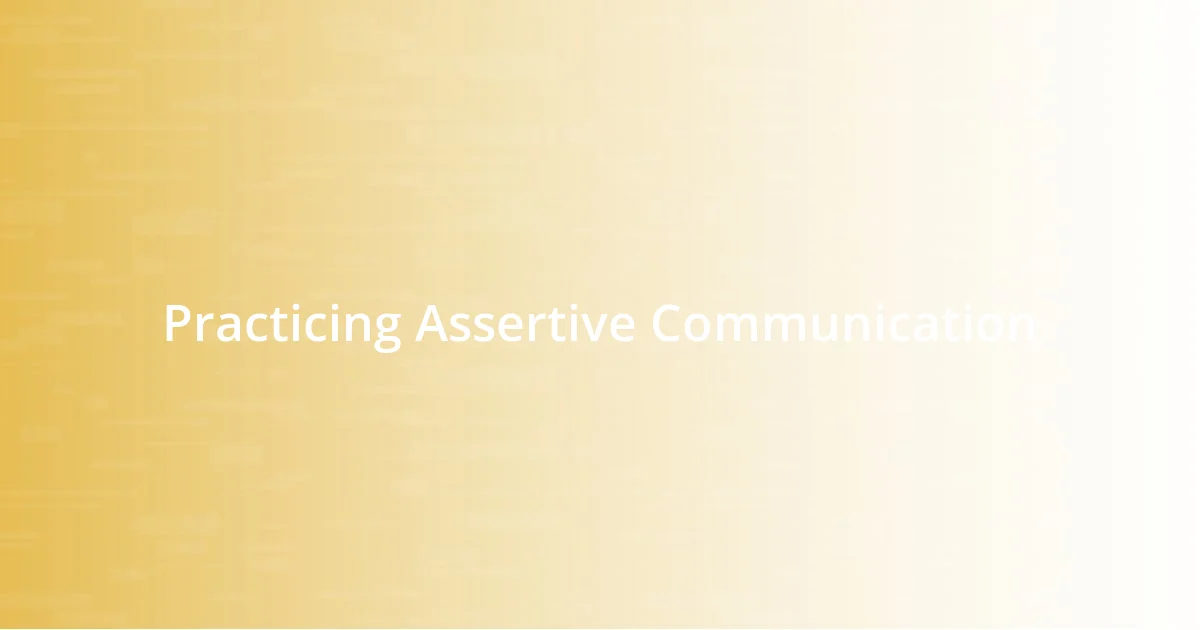
Practicing Assertive Communication
Practicing assertive communication has been a game changer for me. I used to shy away from expressing my needs and opinions, fearing rejection or backlash. One day, during a team meeting, I mustered the courage to speak up about a project issue that had been bothering me. To my surprise, not only did my colleagues appreciate my input, but it sparked a productive discussion that led to meaningful changes. Isn’t it fascinating how asserting yourself can open pathways you never expected?
I found that incorporating “I” statements into my dialogues helped me express my feelings more authentically. Phrases like, “I feel overwhelmed when deadlines aren’t clear” allowed me to share my perspective without sounding accusatory. In those moments, I realized my feelings were valid, and voicing them not only empowered me but also encouraged others to do the same. Have you noticed how using “I” shifts the atmosphere in a conversation? It creates a sense of ownership rather than blame.
Another technique that really helped was visualization. Before the tougher conversations, I would picture myself confidently stating my needs in various scenarios. This mental rehearsal eased my anxiety and reminded me of the outcome I wished to achieve. When I eventually tackled these discussions, I approached them with a sense of calm and purpose. Each successful conversation reinforced the notion that assertive communication is not just about asking; it’s about opening a door to collaboration and understanding.
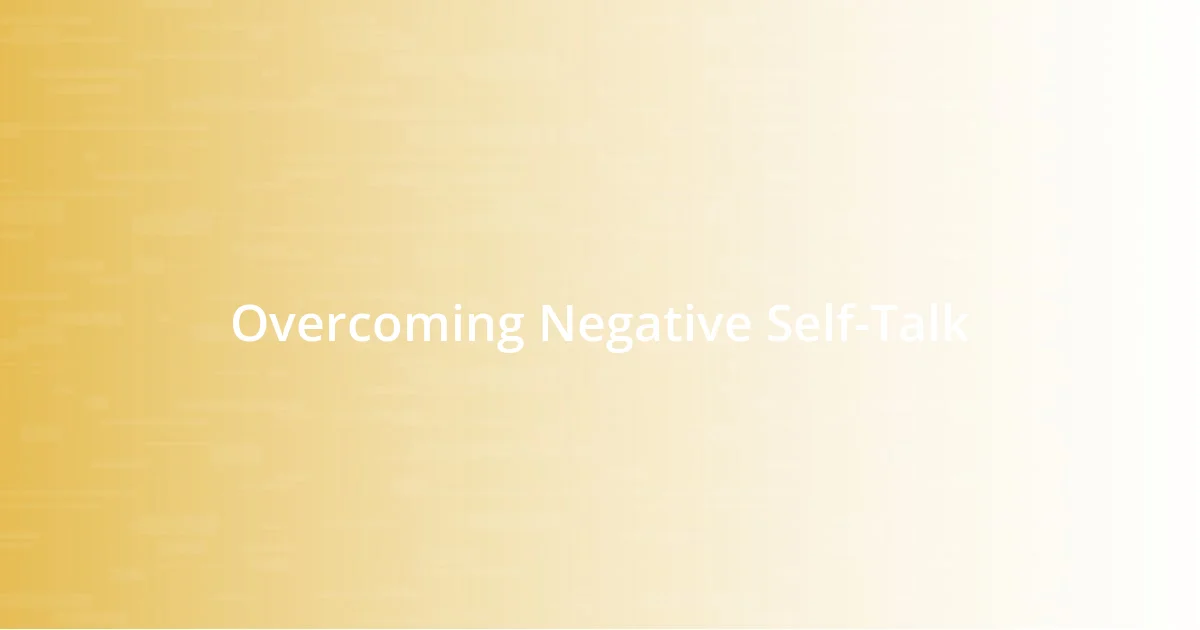
Overcoming Negative Self-Talk
Overcoming negative self-talk was one of the biggest battles I faced on my journey to being an effective asker. I vividly recall instances where I’d tell myself, “They don’t want to hear what I have to say,” or “I’ll just embarrass myself with this question.” Those thoughts were like a heavy fog, clouding my ability to engage. I realized that combating this inner critic was crucial, so I began to challenge those thoughts directly. Whenever a negative thought surfaced, I would counter it with a positive affirmation, affirming my right to ask questions and share my thoughts. This practice didn’t happen overnight, but gradually, my self-talk shifted from self-doubt to self-empowerment.
One day, while preparing for a panel discussion at work, I caught myself spiraling into that familiar negative self-talk again. I took a moment to pause and remember that my insights were valuable, just as everyone else’s were. I wrote down the questions I wanted to ask and instead of telling myself “You’ll flub this,” I reminded myself, “Your unique perspective matters.” That mental exercise not only helped me approach the panel with clarity but also gave me the courage to ask questions that led to fascinating discussions. Have you ever found that your own fears held you back from sharing something valuable?
In time, I learned the importance of surrounding myself with positive influences. I started to seek out friends who encouraged me to speak more openly, and their supportive words had a profound impact. They would often say, “Your thoughts are worth sharing!” This encouragement became a crucial part of my journey, as it reinforced a practice I had adopted: creating a mantra in response to my negative self-talk. Developing this habit transformed my mindset, turning what once felt like obstacles into stepping stones. It helped me recognize that overcoming negative self-talk is not just about silencing the inner critic, but about embracing the empowering voice within—one that propels you forward instead of holding you back.
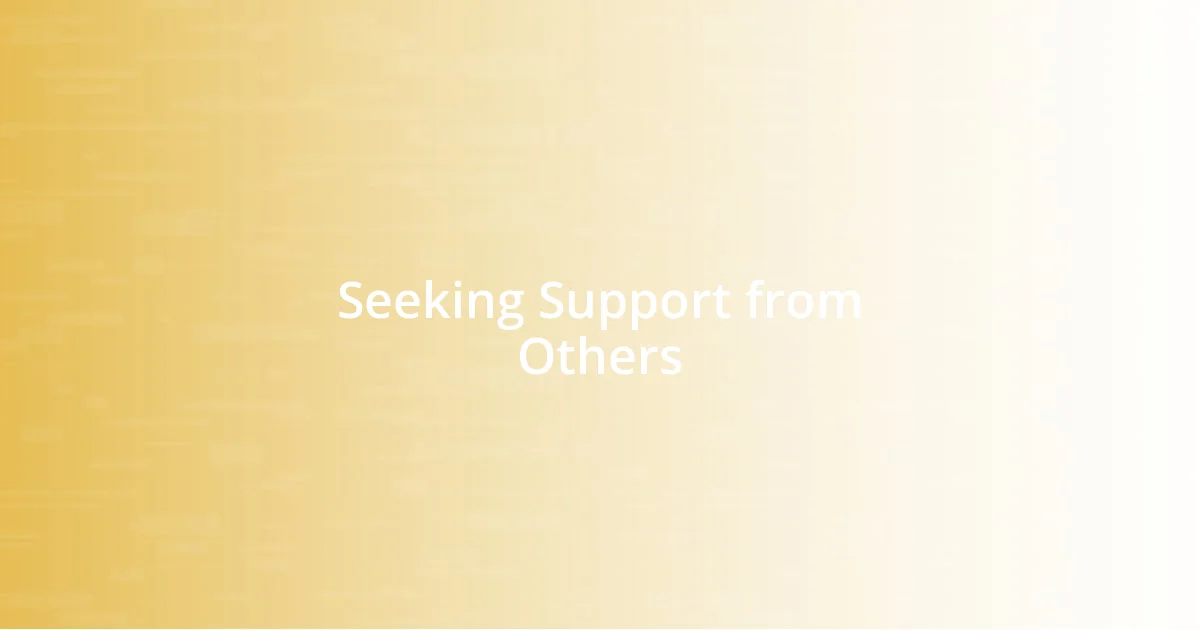
Seeking Support from Others
Seeking support from others proved to be a cornerstone in my journey. I remember reminiscing with a close friend about my struggles with asking for help. She shared her own experiences of uncertainty and the power of vulnerability; her stories made me realize I wasn’t alone. Sharing these burdens allowed both of us to grow closer and fostered an understanding that asking for assistance is a sign of strength, not weakness. Have you ever felt relieved just by talking things through with someone?
I also turned to mentors who had navigated similar challenges. Their guidance offered me valuable strategies for approaching requests more effectively. One memorable conversation with my mentor felt like a breakthrough. She advised me to view asking not as a hurdle but as an opportunity to build connections. The deeper insight shifted my approach entirely: instead of fearing rejection, I began to see each ask as a chance to engage and communicate. How often do we overlook the potential for connection when we’re caught up in our fears?
I’ll never forget the time I joined a support group focused on communication skills. Listening to others share their fears and triumphs was eye-opening. It felt like stepping into a safe space where vulnerability was welcomed. I learned that many people had similar anxieties and, surprisingly, got to witness firsthand how simple support could change perspectives. It reminded me that we’re often stronger together, creating an environment where we can practice asking without fear of judgment. Have you considered how powerful it can be to share your struggles with a group?

Celebrating Your Progress
As I began to recognize the strides I was making, I found it essential to pause and celebrate even the small victories. One day, after successfully asking a question during a meeting, I took a moment to reflect on how far I had come. I remember thinking about all those times I had held back. Each small success fueled my motivation. Have you ever noticed how celebrating little wins can send a ripple of positivity through your day?
I soon realized that acknowledging my progress wasn’t just about the actions I took; it was also about honoring my emotions. There were days when I felt overwhelmed, but I learned to cherish those feelings as part of my growth. For instance, after pushing myself to voice a concern with a colleague, I felt a mix of anxiety and pride. It hit me that feeling vulnerable was a natural part of the journey. Have you ever thought about how vulnerability can actually be a strength in these moments?
As time went on, I created a personal ritual to celebrate my progress. Every week, I would jot down moments of bravery in a journal. I labeled it my “Courage List.” Looking back at that list became a source of inspiration, reminding me of my growth and resilience. Each entry was a testament to overcoming fear. Isn’t it fascinating how documenting our journeys can reignite our sense of purpose and drive? In doing so, I not only acknowledged my progress but also reinforced the idea that every step taken mattered.










